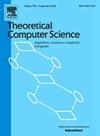具有非密集准时度的离散线性序列
IF 0.9
4区 计算机科学
Q3 COMPUTER SCIENCE, THEORY & METHODS
引用次数: 0
摘要
本文对准时结构进行了系统的研究,准时结构是指无延迟可计算的结构。通过将“原始递归同构”作为约简而得到的(准时)度结构提供了对给定结构枚举的不同速度的洞察。在本文中,我们研究了线性阶的准时度密度的分类。更具体地说,我们构造了一个离散的线性序列,它的准时度不是密集的。本文章由计算机程序翻译,如有差异,请以英文原文为准。
A discrete linear order with non-dense punctual degrees
This paper contributes to a systematic study of punctual structures, which are structures computable without delay. The (punctual) degree structure induced by treating “being primitive recursively isomorphic” as a reduction provides insight into the different speeds of enumerations of a given structure. In this paper, we work towards a classification of density of the punctual degrees for linear orders. More specifically, we construct a discrete linear order whose punctual degrees are not dense.
求助全文
通过发布文献求助,成功后即可免费获取论文全文。
去求助
来源期刊

Theoretical Computer Science
工程技术-计算机:理论方法
CiteScore
2.60
自引率
18.20%
发文量
471
审稿时长
12.6 months
期刊介绍:
Theoretical Computer Science is mathematical and abstract in spirit, but it derives its motivation from practical and everyday computation. Its aim is to understand the nature of computation and, as a consequence of this understanding, provide more efficient methodologies. All papers introducing or studying mathematical, logic and formal concepts and methods are welcome, provided that their motivation is clearly drawn from the field of computing.
 求助内容:
求助内容: 应助结果提醒方式:
应助结果提醒方式:


